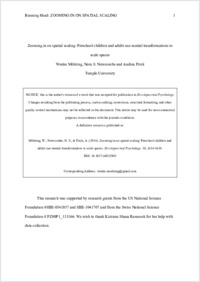Zooming in on spatial scaling: Preschool children and adults use mental transformations to scale spaces
- Möhring, Wenke Temple University
- Newcombe, Nora S. Temple University
- Frick, Andrea Temple University
-
2014
Published in:
- Developmental Psychology. - APA. - 2014, vol. 50, no. 5, p. 1614-1619
English
Spatial scaling is an important prerequisite for many spatial tasks and involves an understanding of how distances in different-sized spaces correspond. Previous studies have found evidence for such an understanding in preschoolers; however, the mental processes involved remain unclear. The present study investigated whether children and adults use mental transformations to scale distances in space. Adults and 4- and 5-year-old children (N = 60) were asked to use maps to locate target objects in a larger referent space on a touchscreen. The size of the referent space was held constant, but the sizes of the maps were varied systematically, resulting in seven scaling factors. A linear increase in response times and errors with increasing scaling factor suggested that participants of every age group mentally transformed the size of the map to compare it to the referent, providing evidence for an analog imagery strategy in children’s and adults’ spatial scaling.
- Faculty
- Faculté des lettres et des sciences humaines
- Department
- Département de Psychologie
- Language
-
- English
- Classification
- Psychology
- License
-
License undefined
- Identifiers
-
- RERO DOC 304980
- DOI 10.1037/a0035905
- Persistent URL
- https://folia.unifr.ch/unifr/documents/305934
Statistics
Document views: 117
File downloads:
- Texte intégral: 236
